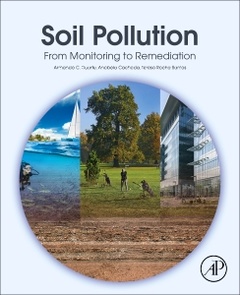Soil Pollution From Monitoring to Remediation
Coordonnateurs : Duarte Armando C., Cachada Anabela, Rocha-Santos Teresa A.P.

Soil Pollution: From Monitoring to Remediation provides comprehensive information on soil pollution, including causes, distribution, transport, the transformation and fate of pollutants in soil, and metabolite accumulation. The book covers organic, inorganic and nanoparticle pollutants and methodologies for their monitoring. Features a critical discussion on ecotoxicological and human effects of soil pollution, and strategies for soil protection and remediation. Meticulously organized, this is an ideal resource for students, researchers and professionals, providing up-to-date foundational content for those already familiar with the field. Chapters are highly accessible, offering an authoritative introduction for non-specialists and undergraduate students alike.
1. Soil and pollution: an introduction to the main issues 2. Distribution, transport and fate of pollutants 3. Changes in ecosystem structure and soil functions due to soil pollution 4. Transformation of pollutants and metabolite accumulation in soils 5. Organic pollutants in soils 6. Inorganic pollutants in soils 7. Nanoparticles as soil pollutants 8. Ecotoxicological effects and risk assessment of pollutants 9. Human health risks and soil pollution 10. Strategies for soil protection and remediation
Professionals and graduate students in soil science, environmental science, analytical chemistry, organic chemistry, biochemistry, biology, toxicology
Dr. Anabela Cachada is a researcher in the area of Risk Assessment and Environmental Chemistry at University of Aveiro and University of Porto (Portugal). She has a PhD in Chemistry and a background in Environmental Sciences and in Geochemistry. She has been working for several years on soil pollution, particularly with organic contaminants. She participated in several multidisciplinary research projects related to soil pollution monitoring and with the behavior of organic contaminants in different environmental compartments. She is particularly interested in the risk assessment of contaminated soils and in the evaluation of organic contaminants’ bioavailability and bioacessibility.
Dr. Teresa Rocha-Santos graduated in Analytical Chemistry (1996) and obtained a PhD in Chemi
- Highlights the relevance of soil pollution for a sustainable environment in chapters written by interdisciplinary expert academics and professionals from around the world
- Includes cases studies of techniques used to monitor soil pollution
- Includes a chapter on nanoparticles as soil pollutants
- Offers comprehensive coverage of soil pollution including types and causes
Date de parution : 10-2017
Ouvrage de 312 p.
19x23.3 cm
Disponible chez l'éditeur (délai d'approvisionnement : 14 jours).
Prix indicatif 153,10 €
Ajouter au panierThème de Soil Pollution :
Mots-clés :
Assessment factors; Background levels; Bioavailability; Black carbon; Contamination; Distribution; Equilibrium partition method; Fate; Functional biodiversity; Gas chromatography; Hazard; Human exposure; Legislation; Liquid chromatography; Metabolites; Mining; Modeling; Monitoring; Nanomaterials; Nutrient cycling; Organic pollutants; Organic pollutants (OPs); PAHs; PTEs; Phytoremediation; Phytostabilization; Pollutants; Pollution; Pollution sources; Potentially toxic elements; Potentially toxic


